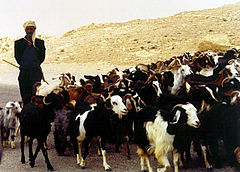| Revision as of 20:33, 3 February 2008 editIlithios (talk | contribs)34 edits herd mentality changed to herding instinct (the correct term)← Previous edit | Revision as of 18:05, 8 July 2008 edit undo70.161.208.216 (talk)No edit summaryNext edit → | ||
| Line 5: | Line 5: | ||
| A '''goatherd''' ({{IPAEng|ˈgoʊtˌhɜrd}}) or a '''goatherder''' is a person who herds ]s for a living. Similar to a ] who tends sheep for a living, the drover here herds goats. Goatherds are popular in countries where goat populations are natively ]; for instance, in ] and ].{{Fact|date=February 2007}} Herding a goat is much more difficult than herding sheep as, unlike sheep, goats do not have a ] and each goat will tend to stray farther in search of better foliage and grass. It is for this reason that, in these areas, goats are costlier than sheep.{{Or|date=September 2007}} | A '''goatherd''' ({{IPAEng|ˈgoʊtˌhɜrd}}) or a '''goatherder''' is a person who herds ]s for a living. Similar to a ] who tends sheep for a living, the drover here herds goats. Goatherds are popular in countries where goat populations are natively ]; for instance, in ] and ].{{Fact|date=February 2007}} Herding a goat is much more difficult than herding sheep as, unlike sheep, goats do not have a ] and each goat will tend to stray farther in search of better foliage and grass. It is for this reason that, in these areas, goats are costlier than sheep.{{Or|date=September 2007}} | ||
| Fictional goatherds include Peter from ] ], and the song |
Fictional goatherds include Peter from ] '']'', and the song "]" from '']''. | ||
| The word capriculturist, which is derived from Latin, began to appear with more frequency in the late 1940s.{{Fact|date=February 2007}} | The word capriculturist, which is derived from Latin, began to appear with more frequency in the late 1940s.{{Fact|date=February 2007}} | ||
Revision as of 18:05, 8 July 2008
| This article does not cite any sources. Please help improve this article by adding citations to reliable sources. Unsourced material may be challenged and removed. Find sources: "Goatherd" – news · newspapers · books · scholar · JSTOR (November 2006) (Learn how and when to remove this message) |
| This article possibly contains original research. Please improve it by verifying the claims made and adding inline citations. Statements consisting only of original research should be removed. (January 2008) (Learn how and when to remove this message) |

A goatherd (Template:IPAEng) or a goatherder is a person who herds goats for a living. Similar to a shepherd who tends sheep for a living, the drover here herds goats. Goatherds are popular in countries where goat populations are natively high; for instance, in Africa and South Asia. Herding a goat is much more difficult than herding sheep as, unlike sheep, goats do not have a herding instinct and each goat will tend to stray farther in search of better foliage and grass. It is for this reason that, in these areas, goats are costlier than sheep.
Fictional goatherds include Peter from Johanna Spyri's Heidi, and the song "The Lonely Goatherd" from The Sound of Music.
The word capriculturist, which is derived from Latin, began to appear with more frequency in the late 1940s.
This job-, occupation-, or vocation-related article is a stub. You can help Misplaced Pages by expanding it. |